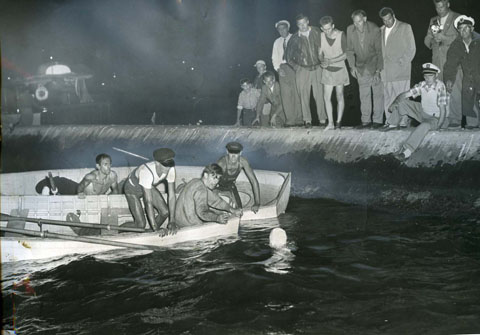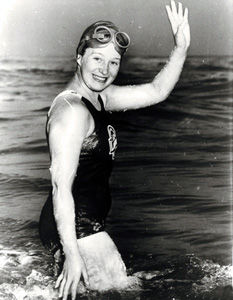Marilyn Grace Bell Di Lascio (née Bell), OOnt, swimmer (born 19 October 1937 in Toronto, ON). Marilyn Bell is a long-distance swimmer, best remembered for her 1954 swim across Lake Ontario, which brought her international fame at the age of 16. She won the 1954 Lou Marsh Trophy as Canada’s athlete of the year, as well as the 1954 and 1955 Bobbie Rosenfeld Award as the country’s top female athlete. She was also named the 1954 Canadian Press Newsmaker of the Year. In 1955, she became the youngest person to swim the English Channel. She also swam across the Juan de Fuca Strait in 1956. She was inducted into Canada’s Sports Hall of Fame and is a Member of the Order of Ontario.

Early Years
Marilyn Bell was born 19 November 1937 in Toronto, Ontario, the daughter of Sydney and Grace Bell. Sydney worked as an accounting clerk. Growing up, Bell attended Toronto’s St. Mary’s School and Loretta College School, where she also sang in the school choir. As a child, Bell and her family moved often, including stops in North Bay, Ontario, and Halifax, Nova Scotia.
Upon their return to Toronto in 1946, Bell’s parents enrolled her in swimming lessons at Oakwood pool. Bell was a natural, swimming one mile in 70 minutes as a nine-year-old. The following year, she entered a one-mile long-distance competition held in Lake Ontario. She also joined the Lakeshore Swimming Club in nearby Etobicoke, where she trained under legendary swimming coach Gus Ryder.
Bell soon established herself as a world-class long-distance swimmer. On 26 July 1954, she competed in the inaugural 41.8 km Atlantic City Centennial Swim in Atlantic City, New Jersey. The event was dominated by Canadians: Tom Park and fellow Lakeshore Club member Cliff Lumsdon finished first and second, respectively. Bell finished first among the women and seventh overall.
Lake Ontario Crossing
In a publicity effort, the Canadian National Exhibition (CNE) had offered popular American swimmer Florence Chadwick $10,000 to swim across Lake Ontario. In response to an urging Canadian public, the CNE eventually expanded the field to include Bell along with fellow Canadian Winnie Roach-Leuszler, who was already famous for swimming the English Channel.
The race began on 8 September 1954 at approximately 11 p.m. Just 16 years old at the time, Bell waded into Lake Ontario in Youngstown, New York, and swam a planned 51.5 km (which ended up being about 72 km, given various course corrections) to a slimy breakwater off Toronto’s western shore. Tension between reporters covering the event from the Toronto Star and the Toronto Telegram came to blows while Bell was in the water fighting lampreys and choking on oil spills. By roughly 5:45 a.m., both Chadwick and Roach-Leuszler had been pulled from the water and exited the race. Bell continued, despite pleadings from her father to withdraw. Gus Ryder, her coach, refused to pull her out of the water even when she seemed semi-conscious.
The crowd waiting in Toronto erupted in excitement when Bell weakly touched the wall in Sunnyside Park 20 hours and 59 minutes after setting out. She was so overwhelmed from exhaustion, sleep deprivation and hypothermia, that she later confessed to having no recollection of completing the feat.

Celebrity
Bell’s accomplishment was reported as a quintessential Canadian achievement: an individual, grim and steadfast, who was not defeated by the elements. Her feat caught the imagination of the country. Many people later matched — and bettered — Bell’s achievement, as marathon swimmers plunged into a mania for lake crossing. (See also Jacques Amyot.) But none quite matched the moment of glory that Bell achieved.
The media spotlight burned bright and the public showered her with gifts and praise. She was a model hero; modest, intelligent, appreciative and charming. In addition to winning the Lou Marsh Trophy as the Canada’s athlete of the year and the Bobbie Rosenfeld Award as the top female athlete of the year, she was also named the 1954 Canadian Press Newsmaker of the Year.
Bell continued to receive celebrity status for her accomplishment, becoming a favourite of the press, who often referred to her as “Canada’s sweetheart.” She appeared on Ed Sullivan’s Toast Of The Town. A TV movie about Bell’s crossing of Lake Ontario — Heart: The Marilyn Bell Story, starring Caroline Dhavernas as Bell — was broadcast in Canada in 2001.
English Channel Crossing
In 1955, the Toronto Telegram offered Bell $15,000 to swim the English Channel. She readily accepted the challenge. On 31 July 1955, she became the youngest person to accomplish the feat, swimming from Cap Gris-Nez, France, to Abbotscliff, England. She finished the swim in 14 hours and 36 minutes. For the second consecutive year, the Canadian Press named Bell Woman of the Year.
Juan de Fuca Strait Crossing
Her next notable long-distance challenge took place the following year, on 23 August 1956. Bell swam across the Juan de Fuca Strait between Vancouver Island and Washington State, beginning in Port Angeles and ending at Victoria’s Beacon Hill Park. She retired from the sport soon thereafter. In 1958, Bell was inducted into Canada’s Sports Hall of Fame.
Personal life
At 19 years old, Bell married Joe Di Lascio, a US law enforcement and parole official. The couple settled in New Jersey. This effectively marked the end of Bell’s competitive swimming career. “After all that attention,” she said, “I wanted to live a normal life.” Bell and Di Lascio had four children together. After devoting her time to raising her family, Bell obtained a teaching degree later in life and went on to teach children with special needs.

Later Years
In her 70s, Bell developed scoliosis and was rendered unable to swim. Following the death of her husband in 2007, she moved to Woodland Pond, a retirement home in New York that has an indoor pool. At age 78, with the help of a former pediatric cardiologist, she retrained her body and returned to the water.
See also Toronto Feature: Budapest Park; Women in Sport; Cindy Nicholas. Vicki Keith Munro.
Awards
- Lou Marsh Trophy (1954)
- Canadian Press Newsmaker of the Year (1954)
- Bobbie Rosenfeld Award (1954, 1955)
- Inductee, Canada’s Sports Hall of Fame (1958)
- Ontario Aquatic Hall of Fame (1993)
- Member, Order of Ontario (2003)
- Inductee, International Swimming Hall of Fame (2021)

 Share on Facebook
Share on Facebook Share on X
Share on X Share by Email
Share by Email Share on Google Classroom
Share on Google Classroom




